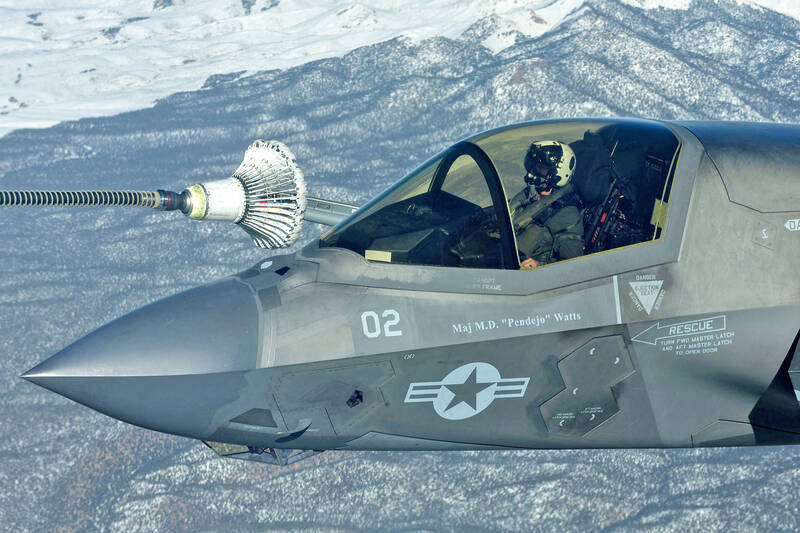Researchers found that Australia — followed by neighbor New Zealand — as the best place to survive a nuclear winter and help reboot a collapsed human civilization.
The study, published in the journal Risk Analysis, describes Australia, New Zealand, Iceland, Solomon Islands and Vanuatu as the island nations most capable of producing enough food for their populations after an “abrupt sunlight-reducing catastrophe,” such as a nuclear war, super volcano or asteroid strike.
There would “likely be pockets of survivors around the planet in even the most severe” scenario, the researchers write, with those in the most resilient nations standing the best chance of avoiding a preindustrial collapse.

Photo: Reuters
The authors compared 38 island countries on 13 factors they said could predict success as a post-apocalyptic survival state, including food production, energy self-sufficiency, manufacturing and the disaster’s effect on climate.
AMPLE FOOD STOCK
Australia and New Zealand — both robust agricultural producers and tucked away from the likely sites of northern hemisphere nuclear fallout — topped the tables, with Australia performing best overall.
“Australia’s food supply buffer is gigantic, with potential to feed many tens of millions of extra people,” the study said.
Australia’s relatively good infrastructure, vast energy surplus, high health security and defense budget all aided in pushing it to the top of the table.
SECURITY RISK
However, Australia did have one major factor working against it: Its relatively close military ties with the UK and the US made it more likely to become a target in a nuclear war.
In this area, New Zealand displayed some advantages, with its longstanding nuclear-free status, the authors said.
Its resilience in the event of an abrupt drop in global temperature prompted by a period of darkness (everywhere in New Zealand is relatively close to the ocean, cushioning it from extreme temperature plunges) would also help.
“We have this super-efficient food export economy that could feed New Zealanders multiple times over just from exports,” said one of the study’s authors, professor Nick Wilson from the University of Otago, Wellington.
Even in the worst-case scenario — a 61 percent reduction in crops during a prolonged nuclear winter — New Zealanders would still have enough to eat, he added.
Despite New Zealand’s abundance of food and its high ranking on social cohesion metrics, a shutdown of global trade could precipitate social collapse by degrees, Wilson added.
“I am concerned about a false security for New Zealand,” Wilson said.
The country no longer had any facility refining fuel, and is intensely dependent on imports for the diesel, pesticides and machinery needed to sustain its dominant agricultural sector.
Other island countries would be able to produce enough food in such a crisis, but the likely collapse of industry and social cohesion put their resilience in doubt, Wilson and coauthor Matt Boyd wrote.
China, Russia and the US could see food production fall up to 97 percent under nuclear winter models and would be forced to rely on new food production technologies, the study said.

Yemen’s separatist leader has vowed to keep working for an independent state in the country’s south, in his first social media post since he disappeared earlier this month after his group briefly seized swathes of territory. Aidarous al-Zubaidi’s United Arab Emirates (UAE)-backed Southern Transitional Council (STC) forces last month captured two Yemeni provinces in an offensive that was rolled back by Saudi strikes and Riyadh’s allied forces on the ground. Al-Zubaidi then disappeared after he failed to board a flight to Riyadh for talks earlier this month, with Saudi Arabia accusing him of fleeing to Abu Dhabi, while supporters insisted he was

‘SHOCK TACTIC’: The dismissal of Yang mirrors past cases such as Jang Song-thaek, Kim’s uncle, who was executed after being accused of plotting to overthrow his nephew North Korean leader Kim Jong-un has fired his vice premier, compared him to a goat and railed against “incompetent” officials, state media reported yesterday, in a rare and very public broadside against apparatchiks at the opening of a critical factory. Vice Premier Yang Sung-ho was sacked “on the spot,” the state-run Korean Central News Agency said, in a speech in which Kim attacked “irresponsible, rude and incompetent leading officials.” “Please, comrade vice premier, resign by yourself when you can do it on your own before it is too late,” Kim reportedly said. “He is ineligible for an important duty. Put simply, it was

The Chinese Embassy in Manila yesterday said it has filed a diplomatic protest against a Philippine Coast Guard spokesman over a social media post that included cartoonish images of Chinese President Xi Jinping (習近平). Philippine Coast Guard spokesman Jay Tarriela and an embassy official had been trading barbs since last week over issues concerning the disputed South China Sea. The crucial waterway, which Beijing claims historic rights to despite an international ruling that its assertion has no legal basis, has been the site of repeated clashes between Chinese and Philippine vessels. Tarriela’s Facebook post on Wednesday included a photo of him giving a

Syrian President Ahmed al-Sharaa on Sunday announced a deal with the chief of Kurdish-led forces that includes a ceasefire, after government troops advanced across Kurdish-held areas of the country’s north and east. Syrian Kurdish leader Mazloum Abdi said he had agreed to the deal to avoid a broader war. He made the decision after deadly clashes in the Syrian city of Raqa on Sunday between Kurdish-led forces and local fighters loyal to Damascus, and fighting this month between the Kurds and government forces. The agreement would also see the Kurdish administration and forces integrate into the state after months of stalled negotiations on